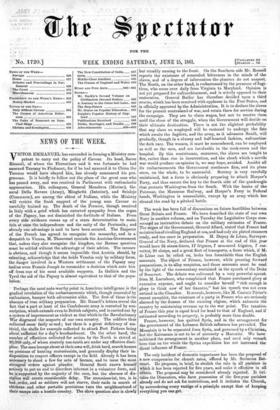The week has been full of discussions on future hostilities
between Great Britain and France. We have described the state of our own Navy in another column, and on Tuesday the Legislative Corps com- mence an instructive debate on the military estimates of France. The organ of the Government, General Allard, stated that France had nointention of rivalling,England at sea, and had only six plated steamers ready, and ten more in preparation. M. Dupuy de Lame, Surveyor- General of the Navy, declared that France at the end of this year
would have 35 steam-liners, 17 frigates, 7 armoured frigates, 7 cor- vettes, 28 sloops, and a'great fleet of transports, a force which, if M. de Lame can be relied on, looks less formidable than the English
accounts. The object of France, however, while pressing forward preparations, is to allay suspicion, and these accounts must be read by the light of the commentary contained in the speech of the Duke of Somerset. The debate was enlivened by a very powerful speech
from M. Larrabure, who complained that France purchased glory at excessive expense, and ought to consider herself " rich enough in glory to think now of her finances," but his speech was not even noticed in the Chamber. It reveals, however, like M. Casimir Pilrier's-, recent pamphlet, the existence of a party in France who are seriously- alarmed by the finance of the existing regime, which exhausts the country by maintaining revenue up to the war point. The taxation, of France this year is equal head for head to that of England, and if estimated according to property, is probably more than double.
France, however, has quitted Syria, and in the arrangement for- the government of the Lebanon British influence has prevailed. The Mountain is to be separated from Syria, and governed by a Christian,.
but the Kaimacam is not to be of necessity a Maronite. We have: criticized the arrangement in another place, and need only remark here that on the whole the Syrian expedition has not increased the direct influence of France.






























